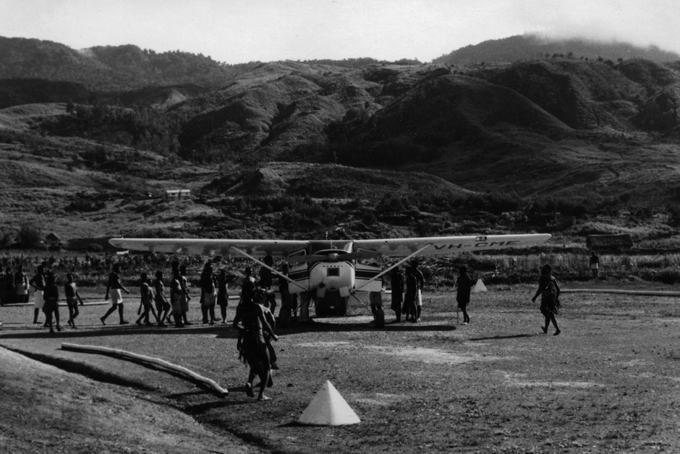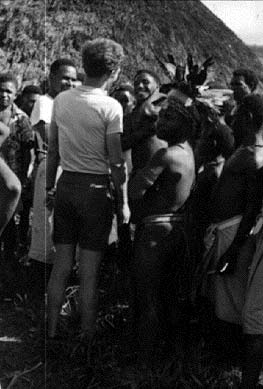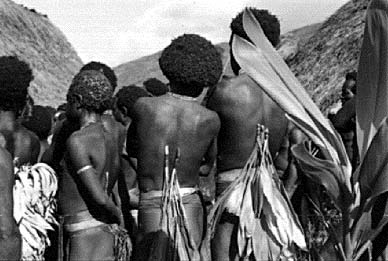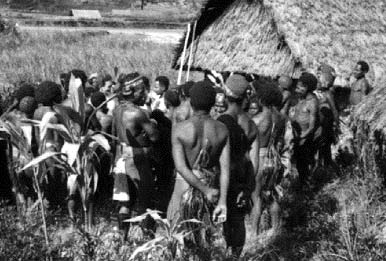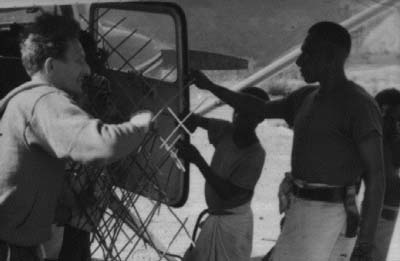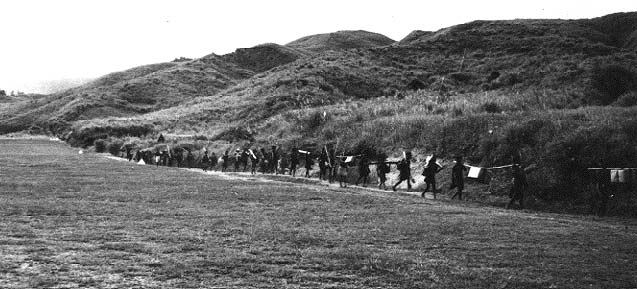we arrived in Simbai on February 27, 1963
|
001-09: Kavali, on the left, translates for Tultul Mbabi, on the right, as Marek listens |
001-11: Young men from Tsembaga crowding around Marek
Marek: "I was just
overwhelmed by the number of people who came to greet us and help us
with our cargo. And I had difficulty understanding why they were so
helpful, friendly, and out-going to someone they had just laid their
eyes upon for the first time. They had no idea what kind of a person I
was or how I felt about them." |
| Allison: "They were curious to meet us, for, up until then, very few 'Europeans' had been in the area. I was only the third white woman to be going into Maring territory in the Simbai Valley." |
|
The men also did not want to pass up one of the rare local opportunities to earn money: by carrying our cargo. These Maring men were as much strangers to the Simbai Patrol Post as we were, for the patrol post was in Karam territory, and was a day's walk from the boundary of Maring territory. The Maring men had no relatives or trading partners in Simbai who could offer them hospitality.
|
001-10: Tsembaga men gather around Marek near the |
Kavali,
who spoke
Maring, Pidgin English, and English, as he had studied at an
agricultural college, helped us to make the necessary arrangements for
them. They would sleep in the haus
passenger, a large, empty thatched
shelter provided by the patrol officer for people coming on
business from distant parts of the district. As for food, Kavali
suggested that we ask
the police for permission for the men to harvest some sweet potatoes
and green vegetables from the gardens which the policemen's wives
cultivated. We ourselves had been
invited to stay overnight at the Anglican Mission
station.
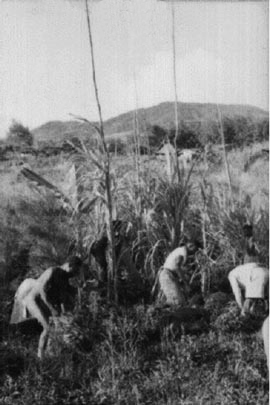
Early next morning the plane bringing our cargo came in.
| Planes coming into Simbai had to arrive before 10 a.m. After that, clouds would close in for the day and the pilots could not see the airstrip. The planes could take off from the Madang airport and land in Simbai with a load of 1,300 pounds - including the weight of passengers. But, because the airstrip in Simbai was short and sloping, the same planes could only take off from Simbai with loads not exceeding 500 pounds. |
|
001-37: One
of the police constables from the Patrol Post helps |
"On the Cessnas you had two limits as far as sending things. One was weight, and one was volume. The people who were doing the loading didn't know how to load: from the point of view of weight, one often could have loaded in more; but from the point of view of volume, they had filled the belly in such a way that nothing else would fit in. The belly had a funny shape: smaller things had to go into each end. Once I had seen that, I would help load whenever I was present, directing which items went in first and where." |
| Once everything was unloaded, the Maring men repacked our cargo into one-man and two-man loads, so they could carry all the things that we had brought in with us. Then we all set off for the long walk on the path which started between the airstrip and the grass-covered, high altitude hills surrounding Simbai. |
|
|
||
|
Marek: "A short time after we got to New
Guinea, I
heard various 'Europeans' talking scornfully about 'cargo cults.' I
nearly died laughing. It was the 'natives' who had the 'cult,' but it
was us 'Europeans' who couldn't do without
dozens of carriers to carry our
belongings when we walked from one place to another."
|
Copyright © 1999-2011 Allison Jablonko. All Rights Reserved. |
